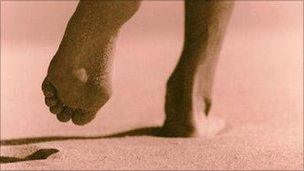Brisk walks fight prostate cancer
- Published

Walks must be brisk to have an effect, the experts believe
Men who have been recently diagnosed with prostate cancer can help keep their disease at bay by taking brisk walks, claim researchers.
Based on their observations, men who power walk for at least three hours a week can halve how much their cancer will grow and spread over the next couple of years.
Strolling does not have the same effect, Cancer Research journal warns.
Experts say it shows that keeping active can improve health.
But they say the findings should be interpreted with caution because the men who did more walking also tended to be younger, leaner, and non-smokers, which could also explain some of the differences seen.
Leg work
The University of California San Francisco study looked at the outcomes of 1,455 men, mostly in their 60s, who were diagnosed with "localised" prostate cancer, meaning it had not yet started to spread.
The men were asked to say how much exercise and of what type they took in the average week.
During the 31 months of follow up, the US researchers recorded 117 events, including disease recurrence, bone tumours and deaths specifically caused by prostate cancer.
And they found that men who walked briskly for at least three hours a week were far less likely to have one of these events.
The brisk walkers had a 57% rate of progression of disease than men who walked at an easy pace for less than three hours a week.
Lead researcher Erin Richman said: "It appears that men who walk briskly after their diagnosis may delay or even prevent progression of their disease.
"The benefit from walking truly depended on how quickly you walked. Walking at an easy pace did not seem to have any benefit.
"Walking is something everyone can and should do to improve their health."
The scientists believe power walking might affect prostate cancer progression by changing blood levels of certain proteins that have been shown in the lab to encourage cancer growth.
Dr Helen Rippon, head of research management at The Prostate Cancer Charity, said: "Although this research will need to be repeated to make sure the results can be applied to all men with prostate cancer, we would certainly advise men diagnosed with prostate cancer to ensure that their lifestyle includes a good amount of physical activity - and walking is often the easiest way of achieving this."
Liz Woolf of Cancer Research UK said: "We know there are many benefits to exercise and that it can help people to recover more quickly after cancer treatment but it's difficult to set specific levels of exercise as everyone's needs and abilities are different.
"Just to be safe, it is important that people with cancer check with their doctor before taking up any new form of exercise."
- Published17 May 2011
- Published1 April 2011